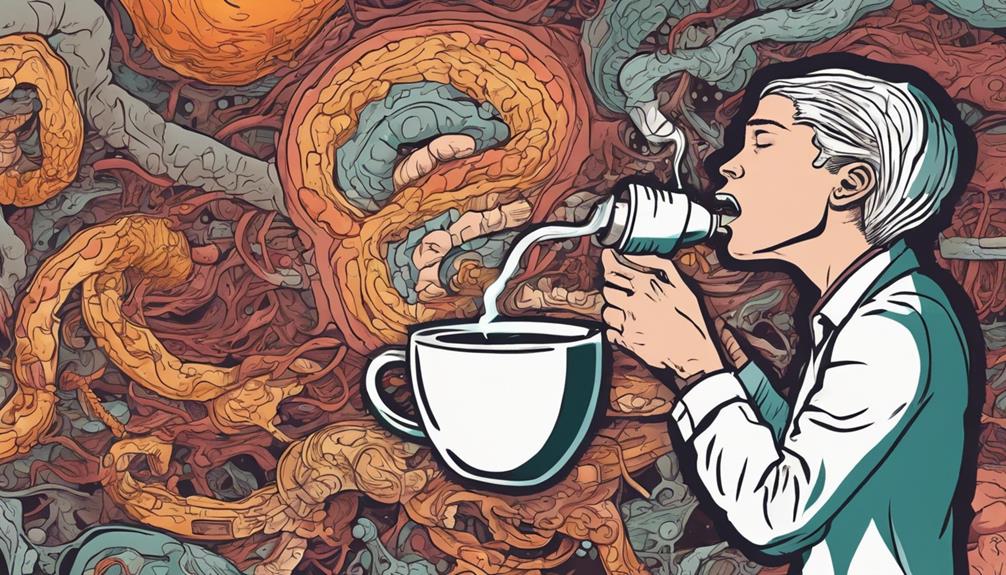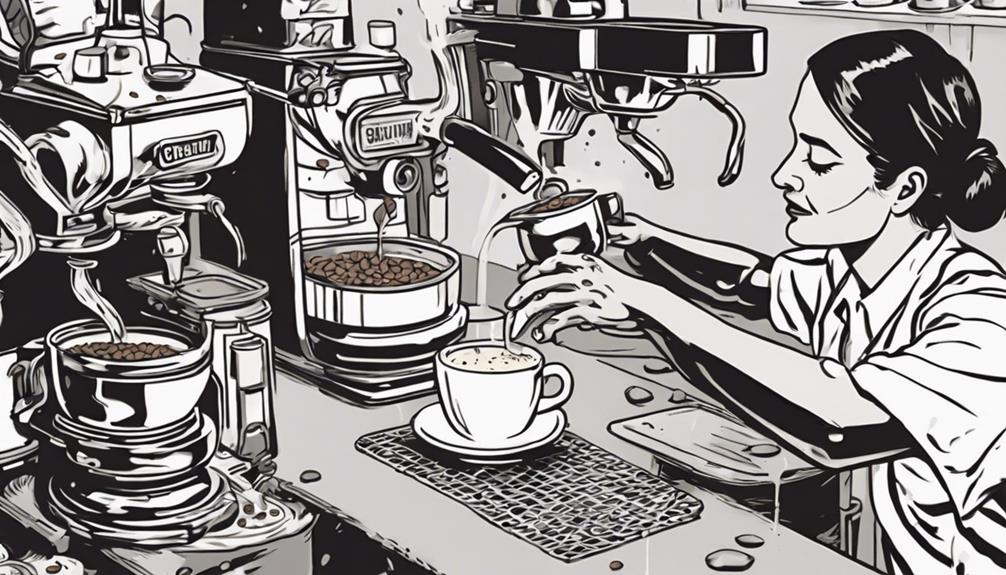For a stronger caffeine boost, try drinking coffee on an empty stomach to ensure faster absorption. Opt for black coffee over versions with milk for quicker effects. Potent brews like cold brew can offer an instant energy surge. Your meal schedule is crucial; fasting before coffee speeds up absorption. Balancing meals helps maintain steady energy levels and caffeine impact. Remember, selecting the right brewing techniques and having caffeine on an empty stomach can improve absorption. Want more tips on caffeine absorption? Think about adjusting to black coffee if you typically add cream or sugar. This adjustment can enhance the caffeine boost and reduce potential interference from other substances. Also, paying attention to your body’s reaction to caffeine can help determine the ideal timing and quantity for consumption. Experiment with different approaches and timing to discover what works best for you and your caffeine requirements.
Key Takeaways
- Drink coffee on an empty stomach for faster absorption.
- Opt for black coffee over creamy additions.
- Choose stronger brews like cold brew for a quick caffeine hit.
- Stay hydrated to enhance caffeine absorption.
- Consume coffee before a power nap for increased wakefulness.
Factors Affecting Caffeine Absorption
Factors influencing caffeine absorption in the body include individual differences such as metabolism and body composition. Metabolism, the process by which your body converts what you eat and drink into energy, plays a pivotal role in how quickly caffeine is absorbed. Individuals with a faster metabolism tend to absorb caffeine more rapidly, feeling its effects sooner than those with a slower metabolism.
Additionally, body composition, which encompasses factors like muscle mass, fat percentage, and overall hydration levels, can impact how caffeine is absorbed. For instance, individuals with higher muscle mass may experience quicker caffeine absorption due to a higher metabolic rate associated with muscle tissue. Surprisingly, staying well-hydrated by consuming water alongside your coffee can also enhance caffeine absorption into the bloodstream.
Water consumption helps with the efficient transport of caffeine throughout the body, potentially leading to a more pronounced and quicker caffeine kick. Understanding these factors can help you maximize the effects of your morning cup of coffee.
Strategies for Faster Caffeine Absorption

To enhance the speed at which your body absorbs caffeine from coffee, consider implementing specific strategies for faster absorption. When aiming for quicker caffeine absorption, drink your first cup of coffee on an empty stomach. This allows the caffeine to be absorbed more rapidly into your bloodstream.
Opting for black coffee over varieties with milk or cream can also expedite the effects, as the absence of dairy products reduces the time it takes for your body to process the caffeine. Additionally, choosing stronger brews like cold brew can provide a more immediate caffeine buzz due to their higher caffeine concentration.
Another strategy for faster caffeine absorption is to have coffee before a short power nap; this combination can enhance wakefulness upon waking. Remember to avoid consuming caffeine with high-fat meals, as doing so can hinder the absorption process and delay the onset of its effects.
Meal Timing and Caffeine Absorption

Considering the impact of meal timing on caffeine absorption, your dietary choices can greatly influence how your body processes and responds to the caffeine in your coffee.
Fasting before consuming your coffee can lead to quicker caffeine absorption, as there's no food in your system to slow down the process. On the other hand, having a meal, especially one high in carbohydrates, along with your coffee can delay the onset of caffeine's effects by affecting its absorption rate.
The timing of your meals can also play a role in how long caffeine remains in your system, influencing its duration of action. By opting for balanced meals, you can help regulate your blood sugar levels, potentially impacting the sustained energy provided by caffeine.
Best Practices for Caffeine Absorption

For best caffeine absorption, focus on incorporating effective strategies into your daily coffee routine. Optimal brewing methods play a significant role in maximizing caffeine extraction from your coffee. Pay attention to factors like water temperature and grind size to make sure you're getting the most out of your brew.
Consuming caffeine on an empty stomach can help speed up absorption. This means that having your morning coffee before breakfast might provide a quicker caffeine kick.
However, keep in mind that certain foods, such as broccoli and cabbage, can influence how caffeine is metabolized in your body. If you have digestive issues, it's crucial to be mindful of how your stomach handles caffeine intake.
Gastrointestinal illnesses can impact the rate at which caffeine is processed, so adjusting your consumption based on your body's response is key for effective absorption.
Timing and Frequency of Caffeine Consumption

Morning consumption on an empty stomach provides a greater energy boost for effective caffeine absorption, but considering the timing and frequency of your caffeine intake can optimize your alertness throughout the day.
To get the best caffeine boost, aim to drink your first cup of coffee in the morning on an empty stomach. This can kickstart your day with a powerful jolt of energy.
However, if you prefer a more gradual increase in alertness, having your coffee with breakfast can provide a sustained rise in caffeine effect.
It's also beneficial to spread out your caffeine intake during the day to prevent sudden crashes and build-up of tolerance. Consider having your next cup around 9:30 a.m. to maximize alertness.
Additionally, strategically consuming caffeine in the afternoon can offer an extra energy boost without interfering with your sleep patterns. By being mindful of when and how often you consume caffeine, you can maintain a steady level of alertness throughout the day.
Health and Safety Considerations

You should be aware of the variability in caffeine sensitivity among individuals.
The potential concerns of developing tolerance to caffeine are important to consider.
The significance of consulting with a healthcare professional about your caffeine intake cannot be overstated.
These factors play a vital role in ensuring your overall health and safety when consuming coffee.
Remember to stay informed and make informed decisions to maintain a balanced and healthy lifestyle.
Caffeine Sensitivity Variability
Understanding the variability in caffeine sensitivity is important for maintaining ideal health and safety when consuming coffee. Individual sensitivity to caffeine can differ significantly due to factors such as genetics, metabolism, and overall health. This unique sensitivity impacts how caffeine affects the central nervous system, influencing its stimulating effects and potential adverse outcomes.
Long-term excessive caffeine consumption can lead to tolerance, necessitating higher doses to achieve the same effects. Health conditions like anxiety can exacerbate the impact of caffeine, increasing sensitivity and susceptibility to its side effects. It's advisable to consult a healthcare provider regarding caffeine intake, particularly for individuals with preexisting health concerns.
To prevent negative health effects and maintain the best sensitivity to caffeine's stimulating properties, moderation in caffeine consumption is essential. By understanding and respecting individual variations in caffeine sensitivity, you can enjoy your coffee while prioritizing your health and well-being.
Tolerance Development Concerns
Developing tolerance to caffeine poses significant health and safety concerns, particularly with long-term excessive intake. Excessive consumption of caffeine can lead to tolerance, where your body becomes less responsive to its effects.
Here are some key points to keep in mind:
- Health impacts: Long-term excessive caffeine intake can have adverse effects on your health, such as increased heart rate, high blood pressure, and disrupted sleep patterns.
- Moderation is key: To prevent tolerance development and its associated risks, it's essential to consume caffeine in moderation. This means being mindful of your daily intake and not relying on caffeine as a primary energy source.
- Diminished effectiveness: As tolerance to caffeine builds up, you may find that you need to consume more caffeine to achieve the same stimulating effects, which can further exacerbate health concerns.
It's important to be aware of how your body responds to caffeine and to prioritize your well-being by practicing moderation in your consumption.
Health Consultation Importance
Considering health and safety, it's essential to consult with a healthcare provider to determine safe caffeine intake levels based on individual health conditions. Your healthcare provider can offer personalized guidance, especially if you're pregnant, breastfeeding, have anxiety, sleep disorders, or heart conditions. Medical supervision is vital for monitoring your caffeine intake in these situations to prevent any adverse effects.
It's important to balance your caffeine consumption with adequate hydration to avoid dehydration and potential health risks.
Additionally, be mindful of potential withdrawal effects when adjusting your caffeine intake. If you experience any discomfort or difficulty when reducing your caffeine consumption, seek professional advice promptly. Your healthcare provider can assist you in managing any withdrawal symptoms effectively and provide guidance on a suitable plan for your caffeine intake.
Prioritizing your health through proper medical consultation ensures that you can enjoy your caffeine kick safely and responsibly.
Additional Considerations for Caffeine Intake

To improve your caffeine intake management, prioritize moderation alongside lifestyle factors like hydration and sleep quality.
When considering additional aspects of caffeine intake, keep the following in mind:
- Limit Consumption: Stick to 4-5 cups of coffee per day to guarantee you don't exceed the recommended 400mg of caffeine, preventing adverse effects.
- Consider Your Body: Recognize individual differences in caffeine metabolism; some people may be more sensitive to its effects than others.
- Understand Variability: Different coffee brews have varying caffeine content, so be mindful of the impact of factors such as brewing method and coffee bean type on your caffeine intake.
Understanding Caffeine's Impact on the Body

You know that caffeine plays an essential role in boosting your alertness, enhancing your focus, and improving your mood.
It works by interacting with neurotransmitters like norepinephrine, dopamine, and serotonin in your brain, leading to increased brain activity and heightened cognitive functions.
Additionally, caffeine has been shown to positively impact athletic performance by reducing perceived effort and increasing endurance during physical activities.
Caffeine and Alertness
Understanding how caffeine affects alertness is essential for optimizing its impact on the body.
When it comes to caffeine and alertness, here are some key points to bear in mind:
- Caffeine plays a significant role in influencing mood, alertness, brain function, and athletic performance.
- Metabolized in the liver, caffeine binds to adenosine receptors, affecting neurotransmitter release and ultimately boosting alertness.
- Neurotransmitters such as norepinephrine, dopamine, and serotonin are impacted by caffeine consumption, leading to increased focus and wakefulness.
Neurotransmitter Effects
Caffeine's impact on the body involves influencing neurotransmitter activity, particularly in the brain. When you consume caffeine, it binds to adenosine receptors, preventing the neurotransmitter responsible for inducing sleepiness from taking effect. This action leads to increased levels of adrenaline, dopamine, and serotonin in your system, contributing to heightened alertness and improved cognitive function. The metabolism of caffeine in the liver also plays a role in altering neurotransmitter activity by obstructing adenosine receptors. It should be noted that the effects of caffeine on neurotransmitter release may vary among individuals due to genetic factors and differences in metabolism.
To better understand how caffeine influences neurotransmitters, take a look at the table below:
| Neurotransmitter | Effect of Caffeine |
|---|---|
| Adrenaline | Increased release, leading to heightened alertness. |
| Dopamine | Enhanced levels, contributing to improved mood. |
| Serotonin | Upregulated levels, potentially affecting mood and focus. |
Athletic Performance Boost
Enhancing athletic performance, caffeine boosts endurance, focus, and motivation during workouts. Whether you're a seasoned athlete or just starting your fitness journey, understanding how caffeine impacts your body can give you a competitive edge.
Here's what you need to know:
- Consuming caffeine: Drinking coffee or taking caffeine pills before a workout can lead to improved energy levels and overall performance.
- Energy levels: Caffeine is rapidly absorbed by the body, influencing neurotransmitter release and providing a quick energy boost that can enhance your athletic abilities.
- Drink Coffee: With its widespread availability, coffee is a convenient and legal way to enhance your athletic performance, making it an accessible option for athletes of all levels.
Frequently Asked Questions
How to Make Caffeine Kick in Faster?
Want a faster caffeine kick? Try black coffee on an empty stomach. Opt for stronger brews like cold brew. Have coffee before a quick nap. Skip high-fat meals with caffeine. Boost your alertness effectively!
What Soaks up Caffeine?
Looking to soak up caffeine? Try an empty stomach or a water chaser for a quicker kick. Remember, high-fat meals might slow things down. Your caffeine journey awaits – choose your absorption adventure wisely!
How to Maximize the Effect of Coffee?
To maximize the effect of coffee, choose robusta beans, adjust the coffee-to-water ratio, brew at 195-205°F, brew longer, and use a finer grind size. These steps enhance caffeine absorption, giving you a stronger kick.
How Do You Get the Most Effect From Caffeine?
To get the most effect from caffeine, you should consider factors like metabolism and body composition. Drinking water with coffee aids absorption. Opt for stronger brews and an empty stomach for quicker results. Boost that buzz!
Conclusion
To sum up, by timing your meals strategically and being mindful of when and how often you consume caffeine, you can maximize its effects and boost your energy levels.
Remember, the key to absorbing coffee effectively lies in understanding how your body processes caffeine and making small adjustments to your routine.
So, next time you reach for that cup of coffee, keep these tips in mind to get the most out of your caffeine kick!









